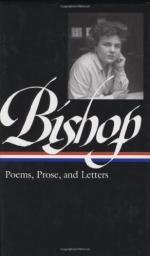|
This section contains 4,166 words (approx. 14 pages at 300 words per page) |

|
[The essay from which this excerpt is taken was written in 1977.]
In Elizabeth Bishop's poetry, geography is not for adventurers looking out from a center at the horizon, not for imperialists seeking to appropriate that horizon. Rather, it is the recourse of those hoping to discover, out of the flux of images, where they are and how to get home again. Bishop's poetry accepts our uncertain relation to other times, places, and things, suggesting we have no "self" otherwise, and no home.
It is in this context that I would like to discuss the pervasiveness of the impersonal and the interrogative in her work. I want to show that, paradoxically, for Bishop, questions are assertions. However open-endedly, they structure experience and self-awareness. Like compasses, they point to something absolute we can neither see nor get to; yet in their pointing, they show us where we are. These questions...
|
This section contains 4,166 words (approx. 14 pages at 300 words per page) |

|


